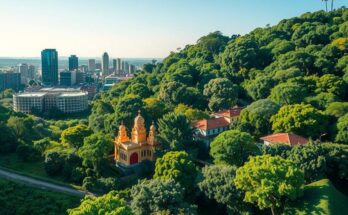Mauritius is facing a significant water crisis due to low rainfall, leading the government to implement strict water restrictions for tourists. The country has recorded notable drought conditions, and water levels in reservoirs are critically low. Officials are responding by drilling additional boreholes and enforcing regulations to conserve water. These developments could adversely affect the tourism sector, which is vital for the nation’s economy.
Mauritius is currently facing severe water shortages due to insufficient rainfall, prompting the government to enforce stringent water restrictions for tourists. Energy and Public Utilities Minister Patrick Assirvaden stated the nation has recorded its second driest January in 25 years, with rainfall in February at merely 43% of the norm. Currently, water levels in the main reservoirs average 41%, exacerbated by cyclone Garance’s inability to replenish supplies.
In response to the crisis, the government is drilling additional boreholes and utilizing private sector water resources. Stringent regulations are now in place to curtail water wastage, including penalties and imprisonment for offenders. Agricultural irrigation, particularly for the vital sugar crop, has been suspended as a precautionary measure.
Minister Assirvaden emphasized the challenges facing Mauritius’ water resources, attributing the situation to climate change, which has led to more frequent and severe drought conditions. These restrictions may impact the tourism experience in a nation reliant on this sector for economic stability and growth.
In summary, Mauritius is enduring a critical water shortage, prompting stringent measures that could significantly impact tourism. The government is actively seeking solutions, including drilling boreholes and enforcing regulations to prevent water wastage. Climate change is cited as a significant factor exacerbating the crisis, necessitating immediate action to safeguard the nation’s water resources. Tourists should remain informed about these developments before planning their visits.
Original Source: www.hindustantimes.com




